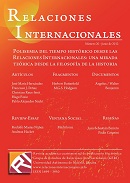The emotional reasons of our security. Hobbes faced with International Relations challenge
Keywords:
resilience , state, emotions, Law of Nations , new imperialism , realism , international relations , securityCopyright (c) 2012 José María HERNÁNDEZ

This work is licensed under a Creative Commons Attribution-NonCommercial-NoDerivatives 4.0 International License.
Abstract
Hobbes is well known for arguing that self-centered, rational and emotional individuals, in a state of nature would chose to leave the state of war in order to form a commonwealth in which the liberty of each individual is subordinated to the power of the sovereign. Should we follow the same claim among the nations that are in the same state of nature relative to each other? Hobbes did not advocate a global Leviathan, and some critics have seen in this particular point a logical inconsistency of his general position. They forget that state security reasons, in Hobbes’s view, only became real for the individuals that form the commonwealth because they are felt through their emotions (competition and cooperation, fear and pride, glory and vain-glory), and only when human associations have grown into states, with a will and an identity of their own, we are allowed to talk about the rational and emotional subjects of the Law of Nations. These artificial subjects are the only subjects that can bring meaning to the Natural Law. Now, these very states as the exclusive interprets of the Natural Law of Nations develop quite different international policies, both in Hobbes’s times and in our times.





